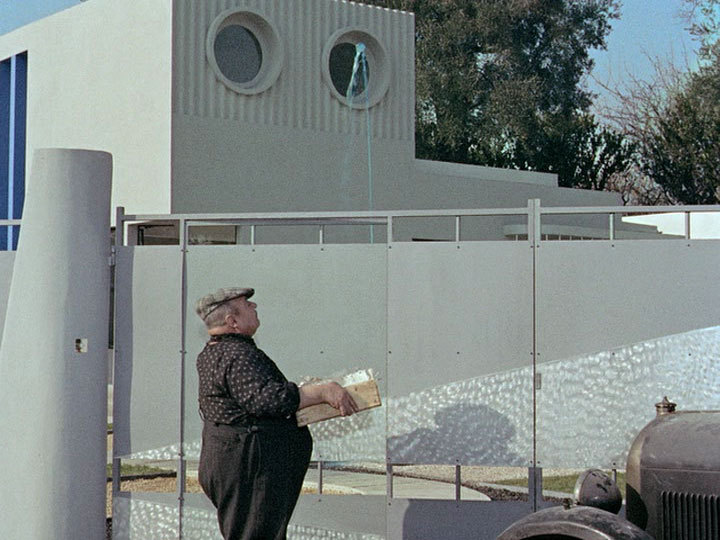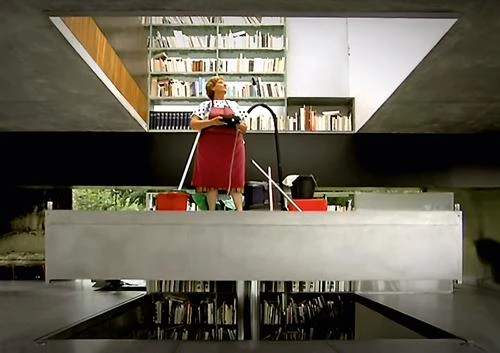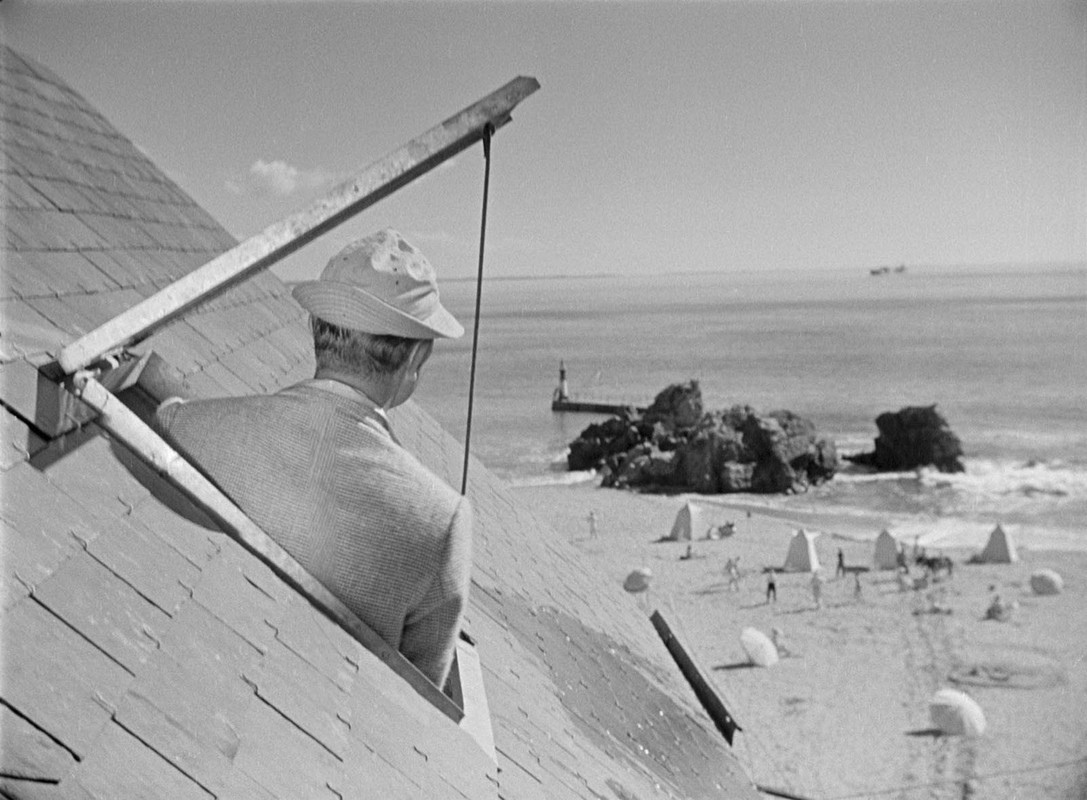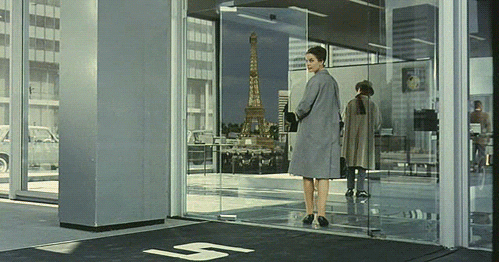– A house like yours must be such a job!
– Oh, a leaf! Ah, yes it's a chore.
– Admit it, you love it.
Mon oncle (Jacques Tati, 1958) / Koolhaas Houselife (Ila Bêka + Louise Lemoine, 2008)
Aug
29
grey


A delivery man in front of the gates of Villa Arpel (via), and custodian Guadalupe Acedo working the lift in Maison à Bordeaux. DP of Mon Oncle: Jean Bourgoin.
[A favourite] colour: grey*
Approaching the 60s, Mr Hulot finally switches from black-and-white to colour. Suddenly, we see that his suit is a beigeish grey and so is the Arpels' house, that modernist masterpiece designed by Tati. The beloved luddite struggles with hypermodern people and their hypermodern constructs, much alike the future Hulot from Playtime (1967).
In similar absurd fashion, Guadalupe Acedo, cleaning lady, works her way through Rem Koolhaas' Maison à Bordeaux (1998) in Bêka and Lemoine's Koolhaas Houselife (2008). Too steep are the stairs, too leaky everything else. Levelheaded, she does her thing; a small beacon of romantic practicality in a world of absurd efficiency.
* the Bales 2025 Film Challenge for August is not date-related but lists, for the most part, the colours of the rainbow.
JacquesTati
“Mr. Hulot is off for a week by the sea. Take a seat behind his camera, and you can spend it with him. Don't look for a plot, for a holiday is meant purely for fun, and if you look for it, you will find more fun in ordinary life than in fiction.” Les vacances de Monsieur Hulot [Monsieur Hulot's Holiday] (Jacques Tati, 1953)
Jul
7

Mr Hulot's view from his hotel room. DPs: Jacques Mercanton & Jean Mousselle.
A film with people at, or taking place in, a hotel*
– opening lines
Located in the real-world Hôtel de la Plage in Saint-Marc-sur-Mer, Mr Hulot lovingly bumbles his way into your heart.
* the Bales 2025 Film Challenge for July is, for unknown reasons, mostly not date-related and follows some sort of vacation narrative.
“Where are you going, Mr. Hulot?”Trafic [Traffic] (Jacques Tati, 1971)
May
16
National Barbecue Day

A man prepares a steak on his nifty Renault 4 Altra grill (there's a pun), observed by M. Hulot and a perplexed Dutch customs officer. In the background a sign in Dutch that requests to refrain from smoking. DPs: Eduard van der Enden & Marcel Weiss.
Monsieur Hulot – who in his final appearance happens to be an automobile designer – travels to a car show in Amsterdam to demonstrate his latest creation, a camper van par excellence. The vehicle of course accommodates the latest gadgets, such as a collapsible grill.
However regarded as a lesser #Tati, Trafic, is another display of lovingly choreographed insanity, notably a #CarCrash that makes me wonder if this was Tati's attempt to transpose Godard's Week-end (1967) into a pleasant, pre-May 68 France.
”'Playtime' is a peculiar, mysterious, magical film. Perhaps you should see it as a preparation for seeing it; the first time won't quite work.”Playtime (Jacques Tati, 1967)
Mar
31
Eiffel Tower Day

A woman in a long grey overcoat holds a glass door of one of the many impersonal, grey modernist buildings. For a brief moment the Eiffel Tower can be seen reflected in the glass, providing a much needed flash of colour. DPs: Jean Badal & Andréas Winding.
Never was or will I be a fan of Jacques #Tati, the loveable Luddite who wouldn't be as big as he became if it wasn't for the technological wonders of the 20th century. Having said that, his Playtime (1967) holds a special place in my heart.
Tati's alter ego Monsieur Hulot roams a hyper-modern #Paris, actually an enormous soundstage dubbed Tativille. People, buildings and gadgets interact with and against each other, each and everyone as plotless as a prop. In unison, it becomes a perfectly orchestrated symphony of maddening modernism.
But Tati wouldn't be Tati if it wasn't for a glimpse of quiet nostalgia. A woman holding the glass-and-steel entrance door of yet another concrete office building. In the glass, a burst of warm light and colour and movement. And then it's gone, and we remember how that tower once was the thorn in the Luddite's eye, that “baroque and mercantile fancy of a builder of machines”.
I'm going to take Mr Ebert's words to heart for my long overdue revisit to #Tativille:
– Roger Ebert